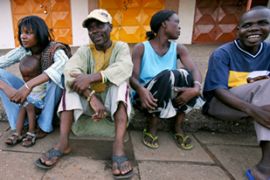Ghana votes for new president
Frontrunners neck-and-neck ahead of joint presidential and parliamentary vote.

Kufuor won the 2004 presidential race after securing 52.5 per cent of the vote, while Mills, who also contested the previous election, got 44.5 per cent.
Voters queue overnight
Voters slept outside polling stations in an attempt to be among the first to cast their ballots.
“The whole world is watching Ghana because Ghana is enlightened,” said Beatrice Mantey, a retired schoolteacher who had sent her niece to queue overnight in order to reserve a place in the voting line.
“No matter who wins, Ghana has already won, because whoever wins we will accept it,” she said.
The ruling NPP is fighting the election on a continuity ticket, pointing to unprecedented economic growth of around six per cent – three times the global average.
| 2004 results |
|
Presidential vote: Parliamentary vote: |
Despite foreign investment rising by 2000 per cent during Kufuor’s two terms and exports more than doubling from $1.6bn in 2001 to $4.2bn in 2002, many Ghanians remain impoverished and infrastructure problems persist.
Wages are low while much of the population, even in the capital Accra, live with inadequate electricity supplies or sewerage.
As a consequence, the opposition NDC is campaigning on a platform for change, saying it is time ordinary Ghanians reaped the benefits of economic success.
Litmus test
The results of Ghana’s simultaneous presidential and parliamentary elections will be closely watched as it is regarded as one of Africa’s most established and stable democracies.
Sunday’s vote will mark the country’s second successive transfer of power – a key litmus test for a mature democracy and something that has been achieved by just a handful of African states to date.
Akwasi Osei, a Ghanaian who is a political science professor at Delaware State University in the US, said: “The significance of this election is that Ghana is going to tell the world, ‘We understand the need for democracy and we can do it … we can get it right’.”
Voting got underway on Sunday at 07:00 GMT, with polling stations closing at 17:00 GMT.
An estimated 12.4 million people have registered to vote, equivalent to around half the country’s population of 23 million.
Results for both the presidential and parliamentary elections are expected to be announced within 72 hours of polling closing.